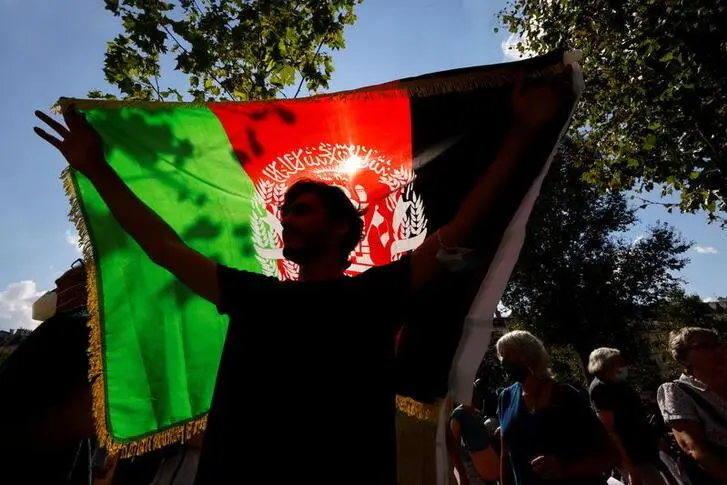PHOTO
The hasty withdrawal of US and NATO troops from Afghanistan before a comprehensive peace deal had been reached has created a chaotic situation in the country and alarmed its Central Asian neighbors. Fears of growing terrorist activity and instability in Afghanistan have spurred the region into action. This crisis may offer an opportunity for the region to again play a greater role in shaping its own future. The Gulf Cooperation Council also sees Central Asia as a potentially important partner in dealing with the new situation in Afghanistan and maintaining peace and security, as well as an opportunity to encourage shared economic interests and common history and culture.
According to the British politician and author Halford Mackinder, Central Asia is the heart of the world. One of the founding fathers of the concepts of both geopolitics and geostrategy in international relations, he believed that, in order for any great power to control the world, Central Asia must be under its control. That may have been an overstatement, but Central Asia remains very significant indeed for the geopolitical interests of many powers, including China, Russia and the US. Central Asia is also important for the Gulf region and the wider Middle East.
Thirty years ago, Kazakhstan, Kyrgyzstan, Tajikistan, Turkmenistan and Uzbekistan — the five countries comprising Central Asia — regained their independence after the dissolution of the Soviet Union. Since then, these landlocked states in the heart of Asia have had to develop their own ways to deal with security, economic, diplomatic and political affairs, as well as to manage their regional relationships in the midst of great power competition for influence.
In 2015, the GCC decided to enhance its collective engagement with the Central Asian countries, in addition to its bilateral cooperation with the individual states. There is considerable potential for an effective and mutually beneficial partnership in several fields, which could be achieved by intensive joint work, propelled by an evidently strong political commitment to pursuing that partnership, especially after the US and NATO withdrawal from Afghanistan.
Central Asia is vast — about 4 million square kilometers — but sparsely populated, with less than 73 million inhabitants in the five countries combined, about 70 percent of whom are in Uzbekistan and Kazakhstan. The region’s combined gross domestic product in 2019 was merely $300 billion and the average per capita income was about $4,100. As elsewhere, COVID-19 has shrunk its economy — the Organization for Economic Co-operation and Development estimated the shrinkage at about 4.5 percent in 2020. They are, however, recovering in 2021. The Asian Development Bank recently revised Central Asia’s growth prospects for 2021 up from 3.4 percent to 3.6 percent, although that would still put it below the 2019 level.
Despite its budding recovery, the region’s full economic potential is yet to be realized and, with that, its influence. GCC countries could help by providing successful examples of countries that went from dirt-poor isolated backwaters to rich international economic hubs in just two generations. They could also provide the investment and know-how needed for such transformations.
Central Asia has many of the most important ingredients needed to thrive today. It is rich in energy resources, including oil, gas, coal and renewables. The region has also been described as a “geologist’s paradise,” as it holds some of the world’s largest deposits of gold, uranium and chromium, as well as significant reserves of bauxite, boron, bismuth, copper, iron, lead, manganese, mercury, salt, silver, titanium, tungsten, and zinc. Economists believe that these energy and mineral reserves form the basis for the region’s future economic growth and development. GCC countries, also being energy and mineral-rich, could help develop those sectors in Central Asia.
Reforms are needed to accelerate growth and remove any obstacles. Infrastructure upgrades are needed in several areas, including for transporting energy, as well as improving the financial, banking and payment systems. GCC countries could help by offering state-of-the-art examples to address these needs, including building modern infrastructures and streamlining financial systems.
In addition to natural resources, tourism — particularly historical and ecotourism — is another promising sector. Some of Central Asia’s cities are among the oldest and best preserved in the world. Bukhara and Tashkent, for example, were established thousands of years ago and contributed to many civilizations throughout history. Samarkand, Ashgabat, Dushanbe and other Central Asian cities also evoke deep feelings of shared history and culture for many in the Muslim world, including the Gulf region. That cultural affinity can augment political and economic partnership between the two regions.
Security is an area of growing importance after the Afghanistan crisis. The Central Asian states and the GCC are equally concerned about the possibility of Afghanistan again becoming a haven for terrorist groups. Containing the threat of terrorism is a priority for both. Political and security dialogue, as well as the exchange of information and expertise, will help both regions achieve that goal.
Afghanistan has also been a source of drug trafficking, which poses a threat to both regions. Traffickers trying to smuggle drugs from Afghanistan, a landlocked country, could be effectively intercepted through cooperation between its neighbors.
These shared interests in maintaining regional peace and stability and growing their economies provide a solid basis for the GCC-Central Asian regional partnership. Their strong historical and cultural ties can form the glue for their renewed engagement after decades of isolation and estrangement.
- Dr. Abdel Aziz Aluwaisheg is the GCC Assistant Secretary-General for Political Affairs & Negotiation, and a columnist for Arab News. The views expressed in this piece are personal and do not necessarily represent GCC views. Twitter: @abuhamad1
Copyright: Arab News © 2021 All rights reserved. Provided by SyndiGate Media Inc. (Syndigate.info).





















